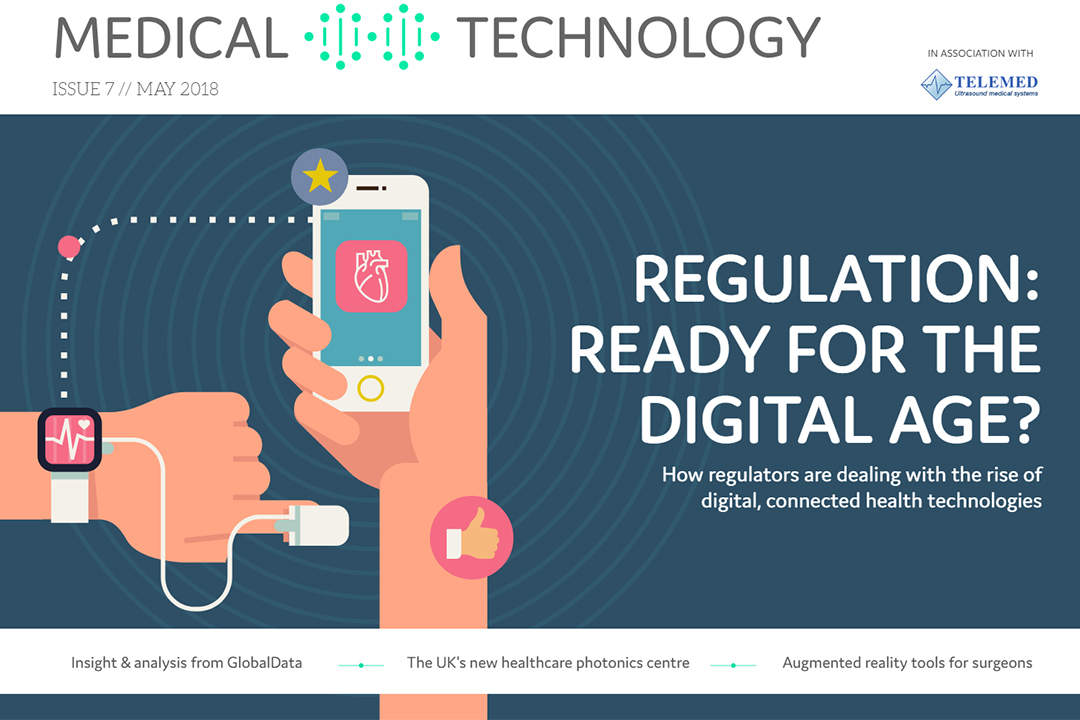
Medical Technology now available on all devices! Read it here for free in the web browser of your computer, tablet or smartphone.
The UK’s National Centre for Healthcare Photonics is due to open this year and will focus on developing novel technologies for imaging, diagnostics and therapy, as well as offering an open-access workspace for industry collaborations. We find out what the new photonics centre will offer to the UK’s medical technology community.

Discover B2B Marketing That Performs
Combine business intelligence and editorial excellence to reach engaged professionals across 36 leading media platforms.
We also look into concerns raised by the Association of British Healthcare Industries over the future of healthcare exports to the EU, which has been identified as a major target for growth, and find out what it will take to facilitate smooth trade of medical products in a post-Brexit future.
Plus, we speak to ApoQlar about its Virtual Surgery Intelligence, a software tool that creates mixed reality 3D models from MRI and CT scans to help surgeons prepare for surgical procedures, and take a look at emerging technologies set to disrupt the healthcare sector in the near future.
As always, we also get the latest comment and analysis from GlobalData’s healthcare analysts on market dynamics, product innovation, regional developments and regulatory issues.
In this issue
Is regulation ready for the rise of digital health products?

US Tariffs are shifting - will you react or anticipate?
Don’t let policy changes catch you off guard. Stay proactive with real-time data and expert analysis.
By GlobalDataInnovations in digital health technology have empowered customers to make better-informed decisions about their health. With an increasing market potential and opportunities for companies to reap the benefits of this potential, regulators are working to establish regulatory standards for a market that is fairly new, primarily driven by software, and one that is rapidly expanding compared to hardware-driven markets.
Laboratory-developed tests are under the regulatory spotlight
A laboratory-developed test (LDT) is a type of in vitro diagnostic that, according to the FDA, must be designed, manufactured, and used all within the same laboratory. Recently, LDTs have become more common and are utilising increasingly complex technology. Concerns have been raised over companies that offer LDTs for high-risk conditions such as heart disease or cancer but do not have the necessary data to support their claims, or whose tests may yield inaccurate results.
23andMe’s at-home genetic test is now approved for breast cancer genes
The FDA recently granted approval to genetic testing company 23andMe to sell at-home kits that test for these very mutations associated with a higher risk of breast cancer. But are these results reliable, or even useful?
FDA approves first AI device to detect diabetic retinopathy
On 11 April the US Food and Drug Administration (FDA) announced the marketing approval of the first medical device to use artificial intelligence (AI) to detect more than a mild level of diabetic retinopathy, the most common cause of vision loss among diabetic patients and the leading cause of vision impairment among the US working-age population.
New wearable MRI scanner could read your mind
A new wearable device could revolutionise the diagnosis of brain tumours and heart disease, with the potential to ‘read’ patients’ thoughts. The prototype, developed by San Francisco-based start-up Openwater, can scan the brain and body with a resolution a billion times higher than that of a traditional MRI (magnetic resonance imaging) device.
Rising number of surgical procedures to drive sutures market to $4.5bn by 2024
The global surgical sutures market, valued at $3.6bn in 2017, is expanding at a compound annual growth rate (CAGR) of 3.4% and is forecast to reach $4.5bn in 2024. Aging populations are at a higher risk of developing a host of diseases and conditions necessitating the need for surgical interventions. This trend will drive higher volumes of surgical procedures, generating greater sales of surgical sutures.
Med Tech trade post-Brexit: it’s time to take action
Healthcare technologies currently move across a frictionless border between the UK and the EU, bringing benefits for manufacturers and patients on both sides. Elly Earls finds out what needs to happen to maintain the smooth trade of medical goods after Britain leaves the EU.
Inside the UK’s new healthcare photonics centre
The UK’s new National Centre for Healthcare Photonics, due to open later this year, will help medical device companies to develop and refine their photonics-based technology, creating new products for the healthcare market. Elliot Gardner finds out more.
Virtual surgery: the healthcare potential of augmented reality
German company ApoQlar is developing the Virtual Surgery Intelligence software tool, which uses mixed reality to help surgeons prepare for and carry out surgery. Abi Millar speaks to the developers about its potential applications in surgical procedures.
Next issue preview
The European Medical Device Regulation (EU MDR) is imposing a new set of translation requirements on the marketing of medical devices in the EU, which apply to packaging, labelling, and usage instructions. For manufacturers this means a significant change in the way they organise and approach translations. We hear from Amplexor how the EU MDR impact packaging and labelling requirements in Europe, and what companies can do to prepare for compliance.
Also in the next issue, we take a look at advances in machine learning for disease modelling and diagnosis, find out what Cyberdyne’s Hybrid Assistive Limb (HAL) exoskeleton will bring to the US rehabilitation market, and learn how healthcare providers can prepare for the increasing digitalisation of patient care.
As always, we also get the latest comment and analysis from GlboalData’s healthcare analysts on market dynamics, product innovation, regional developments and regulatory issues.





